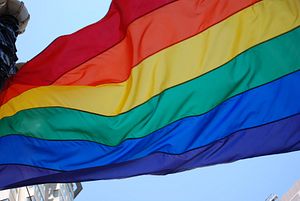In October, news broke about Indonesian Military (TNI) personnel who were dismissed for being a part of the LGBTQ community. As of this writing, TNI had fired and incarcerated 16 service members who were found to be homosexuals with the charge of disobedience to service orders. TNI argues that homosexuality is against military discipline and constitutes a serious violation, as it is “against established laws and religious norms.” And it’s not only TNI – the Indonesian Police (Polri) has also dismissed officers based on their sexual orientations. In May 2019, the Central Java Police fired Police Brigadier “TT” for alleged “deviant sexuality.” He is currently suing to have the police revoke his status of disrespectful dismissal.
TNI and Polri have always been considered as two of the most traditional organizations in Indonesia. Both organizations uphold hetero-normative and patriarchal values. In the Military LGBTQ Index released by the Hague Centre for Strategic Studies, Indonesia ranked 76th out of 103 countries in terms of policies on LGBTQ military participation. While Indonesian law does not prohibit LGBTQ people from joining the forces, there is currently no law that protects its citizens from discrimination based on their sexuality either. In 2009, the TNI commander issued a telegram stating that homosexuality is a heavy violation against military principles and is punishable by the 2004 TNI Law on the basis of indecency – a law that can be loosely interpreted by individuals.
Social justice activists have criticized the sanctions on TNI and Polri personnel based on sexual orientation. For example, Amnesty International Indonesia has condemned it, calling the sentences “unfair and dangerous for society.” On the other hand, an independent research institute called the Institute for Criminal Justice Reform (ICJR) has called the attitude toward LGBTQ service members “a discriminatory stance against the 1945 Constitution.”
On the other side, TNI states that the participation of LGBTQ service members will harm TNI’s discipline and performance. They suggest that LGBTQ individuals are not suitable for military service because they are less capable of conducting military operations, suffer from mental illness, and are more likely to be HIV positive. However, there is no scientific evidence backing the suggestion that LGBTQ individuals are not fit for military service. Studies have shown that LGBTQ inclusion in military service has no negative effects on military effectiveness.
Scholars that oppose the open integration of LGBTQ people in the military force admit that they can actually be effective soldiers. Arguments to ban LGBTQ people from military and police services are not based on the individuals’ merit, but rather how individuals affect the group. In a conservative society, opponents believe that the presence of LGBTQ members will hamper the development of primary group cohesion, which is considered to be an important aspect in military effectiveness.
Those anti-integration arguments can be easily refuted. According to one study, cohesion in the military can still happen despite the members’ diverse ethnicity, racial, and religious backgrounds. Moreover, the same study shows that cohesion in military forces is more likely to happen through situational and structural cohesion – such as common experiences, leadership, and spatial proximity – rather than the homogenous gender or sexual orientation of its members.
Although the problem of LGBTQ exclusion from the military is not exclusive to Indonesia, some countries have gradually accepted the integration of LGBTQ members into their services. The United States, for example, has allowed LGBTQ soldiers to serve openly in the armed forces after repealing the “Don’t Ask, Don’t Tell” (DADT) policy in 2010. Previously, the DADT policy allowed LGBTQ personnel to serve if they kept their sexual orientation secret. The policy itself was an improvement from the previous policy that totally outlawed LGBTQ personnel.
Similar reforms also happened in other countries such as Australia, Canada, Israel, and the U.K. In all these cases, integration did not result in large-scale conflict inside the military. In contrast, opening the military to the LGBTQ community opened a larger pool of talents and saved the military from trial costs and the need to hire new recruits in case of violation. Additionally, acceptance of LGBTQ personnel also plays a role in reflecting the values of equality and human rights.
Hence, it might be beneficial for Indonesia to undertake systematic change toward inclusive policies and practices. While allowing the LGBTQ community to serve openly in TNI and Polri might be still be a goal for the long-term future, the least the authorities can do to ensure inclusivity is to refrain from exploring servicemembers’ private lives. This agenda is actually in line with Indonesia’s legal framework and post-reformation spirit to create a “professional military.” By separating the professional and public life of its servicemembers, TNI and Polri will be able to abolish gender-based discrimination based on subjective prejudice.
However, we should remember that discrimination against LGBTQ service members in TNI is not solely based on incriminating laws. The problem of acceptance lies in the overall perception of LGBTQ rights in Indonesia, where the LGBTQ community still faces widespread discrimination, prejudices, and legal challenges. The integration of the LGBTQ community into the force will not suddenly eliminate the social discrimination against LGBTQ servicemembers nor improve the culture of acceptance in the Indonesian society. Therefore, the Indonesian government’s role is not limited to ensure inclusivity in TNI and Polri, but to improve the gender perception of Indonesian society.
Only after the perception toward the LGBTQ community has been improved can Indonesia have truly professional, inclusive, and gender-balanced military and police forces.
Tangguh Chairil is a lecturer in security studies at the Department of International Relations at Binus University, Jakarta. Aisha R. Kusumasomantri is a lecturer in security studies at the Department of International Relations at the University of Indonesia, Depok. The views expressed are their own.

































